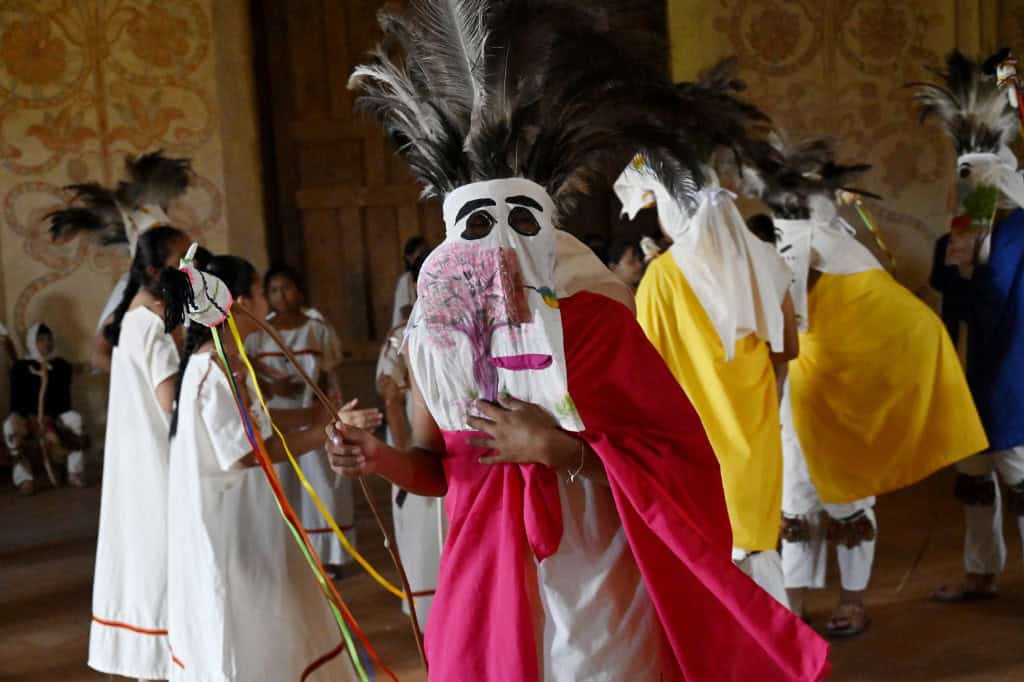A rare Baroque opera written by an indigenous person, whose scores were hidden for centuries in a church in the Bolivian Amazon, came to life with a staging in Bésiro, its original and now endangered dialect.
The symphony orchestra from the town of San Javier, in the Santa Cruz department with nearly 19,000 inhabitants, performed the work for the first time since its discovery in the seventies.
In front of the altar of the San Javier church, Yhorgina Algarañaz and Carla Pereyra, aged 18 and 36 respectively, embody a dialogue in Bésiro between Saint Francis and Saint Ignatius.
The singers wear false beards, black tunics, and sandals. They exchange glances before chanting in the language of the nomadic ancestors: “siromati ape, asaraimia nuxia nipoxti Tupax” (come to heaven to see how good the house of God is).
The audience rises and bursts into loud applause for what would be an unprecedented performance of the opera San Francisco Javier. Historians have not yet determined whether the work, dating from 1740, was ever performed in its time.
“It’s a small world premiere,” exclaims an excited Eduardo Silveira, a 55-year-old Cuban, the director of what is considered the only opera performed in Bésiro known so far.
Bésiro is one of the languages of the Chiquitanos, small indigenous communities that were grouped by the Jesuits in the Amazon region in the 18th century. It is part of the 37 dialects officially recognized in Bolivia, although today it is practically only spoken by the elderly.
It is also one of the seven that are at risk of disappearing, according to the government Plurinational Institute of Language and Culture Studies. There is no census on its current number of speakers.
Unique in the World
A year ago, Silveira and his youth symphony orchestra undertook the task of recreating the work in its original dialect, with the help of the Polish priest and historian Piotr Nawrot.
To the violins, guitars, and cello of the Baroque music, they added drums and other native instruments like the “sananax,” a sort of bamboo trumpet.
Having “the only opera in the world with the text in the local language is already a gain,” highlights Nawrot, 69 years old. Its scores had been jealously guarded by the Chiquitanos in the church of San Rafael, about 300 km from San Javier.
In the seventies, Swiss architect Hans Roth traveled to Bolivia to restore some of the Jesuit temples in the Amazon. During his mission, he found thousands of scores in Spanish and the unique opera in Bésiro. Historians estimate that the work was written anonymously by an evangelized indigenous person.
The reconstruction process was completed in the nineties thanks to the efforts of Nawrot and other specialists. “Reconstructing the music was not as complicated as reconstructing the texts, especially in a strange language that I do not understand and few people speak,” recalls the clergyman.
Learning Bésiro
With the work restored, the Cuban Silveira began preparing the staging. It took the two singers a year to become familiar with Bésiro.
“I asked older people how it is spoken (…) to be able to learn it, since in addition to being a soloist, I was also curious about the way they speak it,” remembers Yhorgina Algarañaz.
The performer alternated the preparation of the opera with her work in the market selling fruits and vegetables. The work finally saw the light at the end of April. San Javier organized a special evening for the launch of the indigenous Baroque opera.
And Silveira is already thinking about the next performance. “We are going to continue, that is our mission,” emphasizes the director, the unexpected promoter of a language in danger of extinction.






